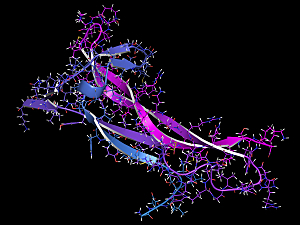Given the increasing number of older individuals in the world population, there is growing interest in finding ways to enhance cognitive functioning, and understanding the biological mechanisms underlying those improvements.
Brain-derived neurotrophic factor (BDNF) has attracted considerable attention because of its important role in brain development and maintenance of function. Animal research suggests multiple ways BDNF could support enhanced cognitive activity.
Kirk R. Daffner, MD, chief of the Division of Cognitive and Behavioral Neurology at Brigham and Women’s Hospital and director of the Center for Brain/Mind Medicine, and colleagues found five weeks of cognitively stimulating activity by healthy older adults increased BDNF levels and cognitive performance. In Alzheimer’s & Dementia (N.Y.), the team also reports evidence that the improvement in cognition with training was mediated by increases in BDNF.
Methods
This analysis is the latest from the Successful Aging and Enrichment study, a randomized, controlled trial conducted at the Brigham and Linnaeus University in Växjö, Sweden. The current cohort of 157 participants was aged 65 or older, and had normal scores on the Mini-Mental State Examination and a test of delayed recall.
Participants were randomized into one of four intervention groups:
- The PACE-Yourself aerobic exercise program
- Mindfulness meditation training
- Adaptive computerized cognitive training (CCT)—Adaptive Cogmed training, which involves remembering a series of numbers, letters, shapes, or spatial locations for immediate recall; the task difficulty was revised after each trial to establish 60% accuracy, creating a consistently challenging level of difficulty for each individual
- Active control—Cogmed training in which the task difficulty remained at a constant, relatively low level
All interventions involved five 40-minute sessions per week for five weeks. Participants interacted with the study team from their homes using laptops provided by the study sites.
The two main outcome measures were pre- to post-intervention changes in serum BDNF level and performance on the untrained Digit Symbol Test (DST) of the Wechsler Adult Intelligence Scale, fourth edition. The DST primarily tests working memory and processing speed, two cognitive functions emphasized in Cogmed training.
Effect of Time and Intervention
After five weeks, the adaptive CCT group exhibited significantly increased BDNF levels and significantly improved DST scores. The control group demonstrated no significant changes in either outcome.
There were no time-by-intervention interactions for BDNF level or DST score when comparing the exercise group or the mindfulness group to the control group.
Path Analysis
Path analysis more directly linked BDNF to changes in cognitive performance, showing the improvement in the adaptive CCT group relative to controls was mediated by intervention-related increases in BDNF. This relationship has not been demonstrated previously in healthy adults.
BDNF Levels and Cognitive Function
The larger the increase in BDNF, the greater the improvement in DST performance. This relationship was found whether analyzing the sample as a whole, the three intervention groups together, or each intervention group separately (e.g., for the adaptive CCT group, r2=0.16; P=0.01).
Interpreting the Findings
These results demonstrate that changes in BDNF play an important role in improving performance on tasks that rely on working memory and processing speed. They support the idea that older adults retain the capacity for brain plasticity, which can be elicited by participating in cognitively stimulating activities.
